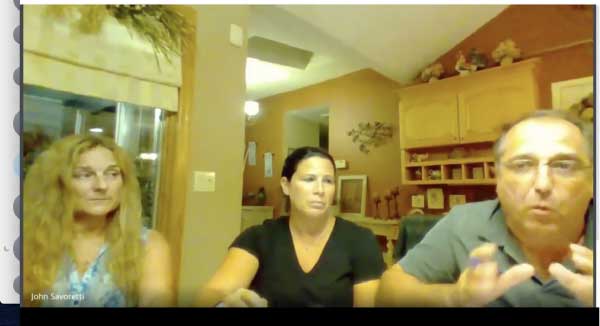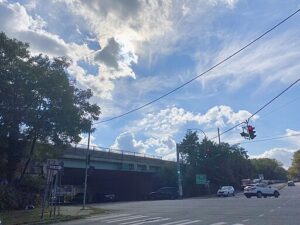By Leah Chiappino
The Smithtown School Board meeting went virtual Sept. 14, but not because of Covid-19.
Rather, the decision was owing to the aggressive behavior displayed by angry community members at meetings over the summer, Board President Matthew Gribben said.
“Over the last few meetings, I have seen a young boy ridiculed at the microphone, I’ve seen a woman grieving for her lost child who was taunted, and then even so much as physical threats being made to people in the district and in the auditorium,” he said. “To me, that’s not OK.”
Smithtown Board of Education Trustees Stacy Ann Murphy, Karen Wontrobski-Ricciardi and John Savoretti debated holding meetings virtually on Sept. 14.
“Hopefully, by going virtual tonight, we were able to take a step back, [and] we’re able to lower the temperature,” Gribben continued.
Gov. Kathy Hochul signed legislation Sept. 2 to extend the Open Meetings Law to allow local governments to hold virtual meetings during the pandemic, as long as there is a way for the public to view or listen to the meeting. Constituents still must be informed ahead of time that the meeting is taking place, and instruction must be provided on how to access it.
For some community members, the decision to go remote was a welcome change. “The board meetings have become an embarrassing disgrace, and the focus is no longer on our children or the quality of education that they receive,” Smithtown parent Carrie Tranbauer said in a written comment. “I hope you continue the meetings virtually so that we can move on to new business for the benefit of our children and the community at large.”
The meeting grew heated when trustees Karen Wontrobski-Ricciardi, Stacy Ann Murphy and John Savoretti said they were excluded from the decision to go virtual, and the public was not adequately informed of the change.
“I didn’t feel like we did have a good enough discussion about it or any discussion,” Wontrobski-Ricciardi said.
Trustee Michael Catalanotto fired back, saying all board members were involved in the decision. “ I was part of the same conversation that we all were,” he said. “People need to feel comfortable going to these board meetings and speaking, and if they feel endangered, whether it’s their health, their own safety, it’s not fair.”
Wontrobski-Ricciardi added that she was worried going remote would come across as though the district was attempting to hide something because of the upcoming $120 million bond that the community was to vote on Sept. 28, though the district was set to host a series of in-person forums to give the community an opportunity to learn about the bond.
The referendum passed the public vote.
Andrew Tobin, the assistant superintendent for finance and operations, said the bond funds will go toward “essential infrastructure and safety upgrades,” including HVAC systems to improve ventilation, lighting improvements, repairs to asphalt and sidewalks, window, door, and ceiling replacements, and upgrades to fire alarm systems in all district buildings. The package does not include installing air conditioning throughout the district, as the cost of that would be $50 million alone.
Upgrades to auditoriums, as well science, family and consumer science, technology, and robotic classrooms, locker rooms, concession stands, fitness centers and athletic fields, will also be funded through the bond.
Fifty-eight percent of the cost of the improvements will be funded by state aid, and the remainder will be funded through the bond, Tobin said.
The district has not had a bond vote in 20 years. The bond will replace $3.2 million in expiring debt.
The meeting again turned contentious when board members discussed the potential of suing the state over the mask mandate in schools, a move already undertaken by the Massapequa and Locust Valley school districts.
Superintendent Mark Secaur said students and staff will, for the time being, still be required to wear masks, pursuant to state guidelines.
“We all hope that the mask mandate does not need to be in place for long, but for now, it is where students and staff will need to wear them,” Secaur said.









